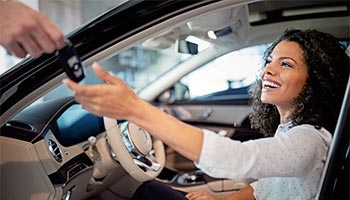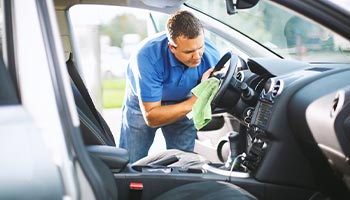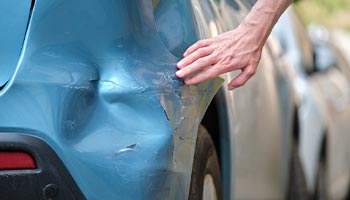There are endless reasons to be excited about a fresh set of keys, whether it’s the updated technology and safety features or that famous new car smell. However, despite the excitement, it’s no secret that a new car is a costly purchase. And with ongoing market and supply disruptions, the auto landscape has been in a significant flux. Still, if you find yourself in the market, understanding the difference between leasing and buying a car can make a difference in how much you spend. Follow this guide to learn the pros and cons of each decision to determine if you should lease or buy a car.
Should I Lease or Buy a Car: What’s The Difference?
Leasing a Car

When you lease a vehicle, you pay to drive the car for a predetermined number of miles and time (typically 2-3 years). Then, at the end of the lease, you return the car to the dealer. Simply put, leasing a car is a way to rent a vehicle for an extended time. Although leasing requires monthly payments, these payments do not go toward vehicle ownership. Some contracts allow you to purchase the car at the end of your lease.
Buying a Car
Buying a car is a much simpler process. You can either pay the car’s total price upfront or finance the purchase through a lender. If you decide to finance, you’ll need to make a down payment in addition to monthly payments (with interest) until the loan is paid off. From there, you can continue driving the vehicle for as long as you’d like while being free to sell or trade it at any time.
Leasing Vs. Buying a Car: Pros and Cons
Pros of Leasing a Car
- A new car every few years – If you enjoy having the latest features and tech in your car, leasing is one way to frequently change the vehicle you drive. Once your lease is up and you return the car, you can move on to a newer model.
- Lower monthly payments – When compared to buying a car, leasing typically involves a smaller down payment and lower monthly costs. Because of this, you may be able to lease a higher-end vehicle that you could not afford to purchase.
- Warranty-covered maintenance – When you lease a new car, it’ll likely still be under warranty, which can help you save on some basic maintenance costs. Be sure to double-check your contract to understand what is covered.

Cons of Leasing a Car
- No ownership – One of the most significant drawbacks to leasing is that you do not own the vehicle despite making monthly payments and maintaining it. Once the lease ends, you must return it to the dealership.
- Never-ending payments – If you lease every vehicle you drive, you will constantly make monthly car payments.
- Restrictions – Most lease contracts include mileage limits which could restrict how much and how far you drive. Additionally, suppose you make any modifications to the vehicle. In that case, you’ll likely be charged a fee when you turn the car in.
- Fees and extra costs – Although leasing a car can be cheaper than buying, there are still a handful of fees that can raise the final price of a lease. You may face fees for exceeding your mileage limits, causing extra wear and tear, or for terminating a lease early.
Pros of Buying a Car
- Long-term cost – Although monthly payments may be cheaper on a lease, in the long run, it is typically cheaper to buy a car and hold onto it for the duration of its life.
- Total ownership – Because you’re purchasing the car, you can modify the vehicle however you’d like.
- Upgrading – Once the car is yours, you can sell or trade it for an upgraded vehicle.
Cons of Buying a Car
- Loans and credit – Unless you pay for it in full, you’ll need to finance your car’s purchase by getting a loan. This means you’ll be paying interest on the car’s original price. In addition, failure to make your payments on time could affect your credit score.
- Value depreciation – Unfortunately, your car will decrease in value when you drive it off the car lot. Unlike homes, you probably won’t profit when you sell your car down the road.
- Higher payments – When compared to leasing, financing a car will typically involve higher payments.
Should I Buy or Lease a Car?
The decision to lease or buy will ultimately come down to your finances and personal needs. For most consumers, buying makes the most financial sense and according to market data, drivers understand this. In July 2022, leases comprised less than 20% of the auto market. Still, there are a few scenarios where leasing can be a better option than buying.
If you find yourself in one of the following situations, leasing may be worth considering:
- You only need a car for a short amount of time – If you’re an expatriate or if you only need a car for a few years, leasing can provide you with driving access without the responsibility of being a car owner.
- You’re unable to cover monthly payments – If you cannot afford the monthly payments on a car loan, you may be able to save significantly by leasing, depending on the car model.
- You’re an older driver – Senior drivers with low annual mileage and a fixed income may benefit from leasing a car instead of buying one. By leasing, they can take advantage of the latest safety features and not have to worry about extensive maintenance.
What About Insurance?

You will still need to purchase auto insurance regardless of whether you lease or buy a car. Nearly every state requires drivers to carry liability insurance, which helps pay for injuries and damage you cause to someone’s property. If you lease or finance the car, your contract may require you to carry additional coverage types, such as:
- Comprehensive and collision coverage – Covers physical damage on a vehicle caused by an accident, natural event, or vandalism.
- Gap insurance – Depending on your contract, you may also be required to purchase gap insurance, which covers the gap between the vehicle’s actual cash value and what you owe.
Whether you have your eyes set on a specific model or just browsing, it’s always a good idea to compare auto insurance rates before heading to the dealership. That way, you can better understand what you can afford and be one step closer to driving your dream car off the lot. At AIS, comparing quotes from our network of providers is a quick and easy process. To learn more about the coverage options available to you, give us a call at (888) 772-4247, or start a free quote online today.
The information in this article is obtained from various sources and is offered for educational purposes. Furthermore, it should not replace manuals or instructions provided by the manufacturer or the advice of a qualified professional. No warranty or appropriateness for a specific purpose is expressed or implied.


